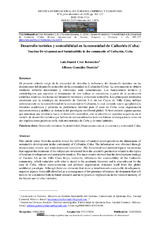Mostrar el registro sencillo del ítem
Desarrollo turístico y sostenibilidad en la comunidad de Caibarién (Cuba)
| dc.contributor.author | Cruz Bermúdez, Luis Daniel | |
| dc.contributor.author | González Damián, Alfonso | |
| dc.date.accessioned | 2021-01-12T12:20:28Z | |
| dc.date.available | 2021-01-12T12:20:28Z | |
| dc.date.issued | 2020 | |
| dc.identifier.issn | 2530-7134 | |
| dc.identifier.uri | http://hdl.handle.net/10396/20960 | |
| dc.description.abstract | El presente artículo surge de la necesidad de desvelar la influencia del desarrollo turístico en las dimensiones del desarrollo sostenible de la comunidad de Caibarién (Cuba). La información se obtuvo mediante revisión documental y entrevistas semi estructuradas. Los fundamentos teóricos y metodológicos que soportan el tratamiento de este trabajo se estructuran a partir de la producción científica relativa a los temas del desarrollo turístico y el turismo sostenible. Los principales resultados mostraron que la estrategia de desarrollo de Gaviota S.A en los Cayos de Villa Clara, influye indirectamente en la sostenibilidad de la comunidad de Caibarién, lo cual coincide con lo que plantea la literatura académica y presenta su pertinencia también para el caso de Cuba, cuya organización socioeconómica y política se distancia del paradigma neoliberal global. Si bien existen algunas pautas que muestran una tendencia hacia el desarrollo sostenible, aún se identifican aspectos negativos en el modelo de desarrollo turístico que habrán de ser considerados tanto en futuras investigaciones como en sus implicaciones prácticas en la industria turística de Cuba y de otras latitudes. | es_ES |
| dc.description.abstract | This article arises from the need to reveal the influence of tourism development on the dimensions of sustainable development in the community of Caibarién, Cuba. The information was obtained through documentary review and semi-structured interviews. The theoretical and methodological foundations that support the treatment of the subject are structured from the scientific production related to the topics of tourism development and sustainable tourism. The main results showed that the development strategy of Gaviota SA in the Villa Clara Keys, indirectly influences the sustainability of the Caibarién community, which coincides with what is stated in the academic literature and is also relevant for the case of Cuba, whose socio-economic and political organization distances itself from the global neoliberal paradigm. Although there are elements that show a trend towards sustainable development, negative aspects were still identified as a consequence of the presence of tourism development that will have to be considered both in future research and in its practical implications in the tourism industry of the Island and of other latitudes. | es_ES |
| dc.format.mimetype | application/pdf | es_ES |
| dc.language.iso | spa | es_ES |
| dc.publisher | UCOPress | es_ES |
| dc.rights | https://creativecommons.org/licenses/by-nc/4.0/ | es_ES |
| dc.source | Revista Internacional de Turismo, Empresa y Territorio (RITUREM) 4(2), 103-127 (2020) | es_ES |
| dc.subject | Desarrollo turístico | es_ES |
| dc.subject | Sostenibilidad | es_ES |
| dc.subject | Dimensiones social, económica y ambiental | es_ES |
| dc.subject | Cuba | es_ES |
| dc.subject | Tourism development | es_ES |
| dc.subject | Sustainability | es_ES |
| dc.subject | Social, economic and environmental dimensions | es_ES |
| dc.title | Desarrollo turístico y sostenibilidad en la comunidad de Caibarién (Cuba) | es_ES |
| dc.title.alternative | Tourism Development and Sustainability in the community of Caibarién, Cuba | es_ES |
| dc.type | info:eu-repo/semantics/article | es_ES |
| dc.relation.publisherversion | http://www.uco.es/ucopress/ojs/index.php/riturem/index | es_ES |
| dc.rights.accessRights | info:eu-repo/semantics/openAccess | es_ES |

